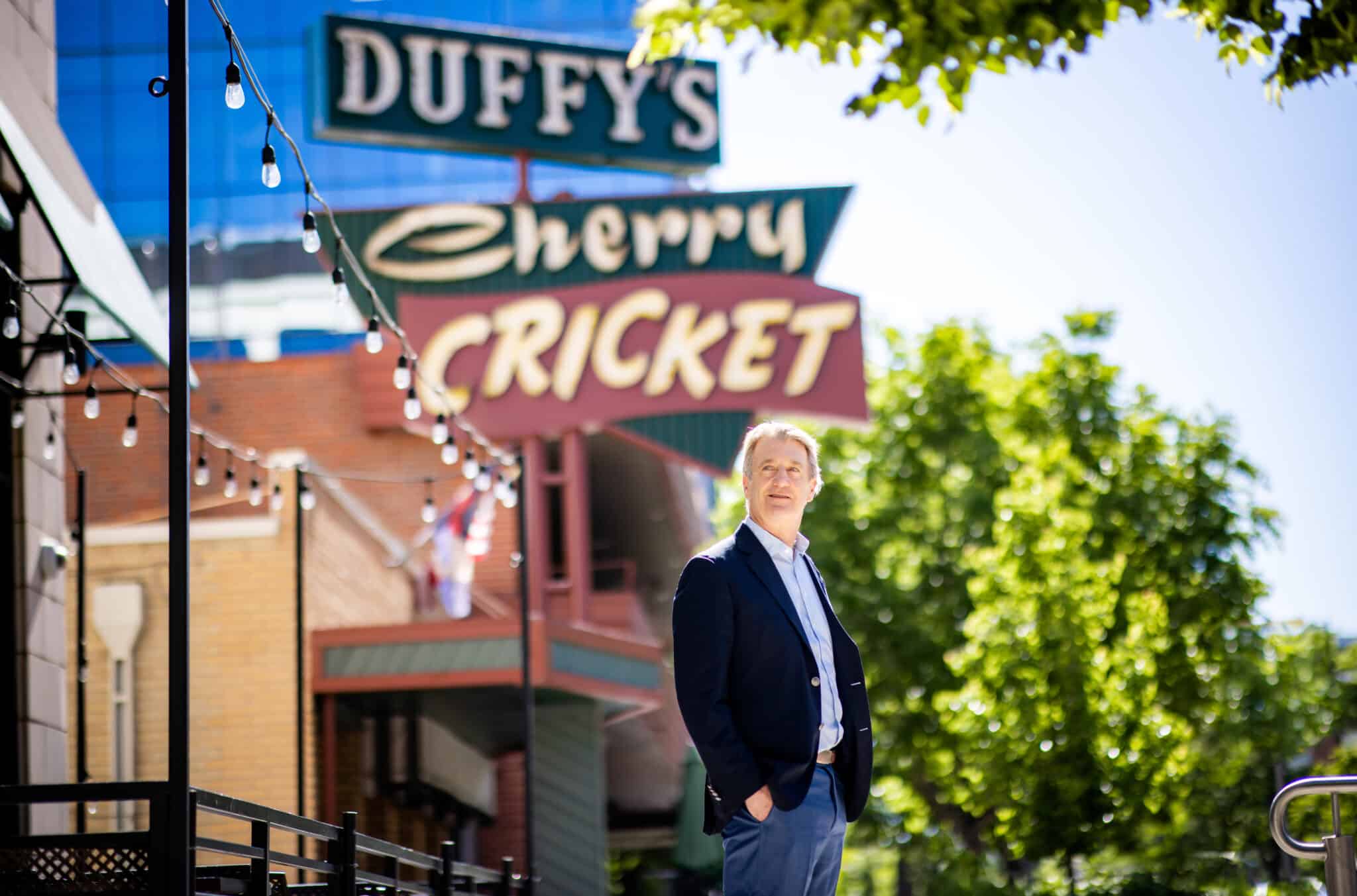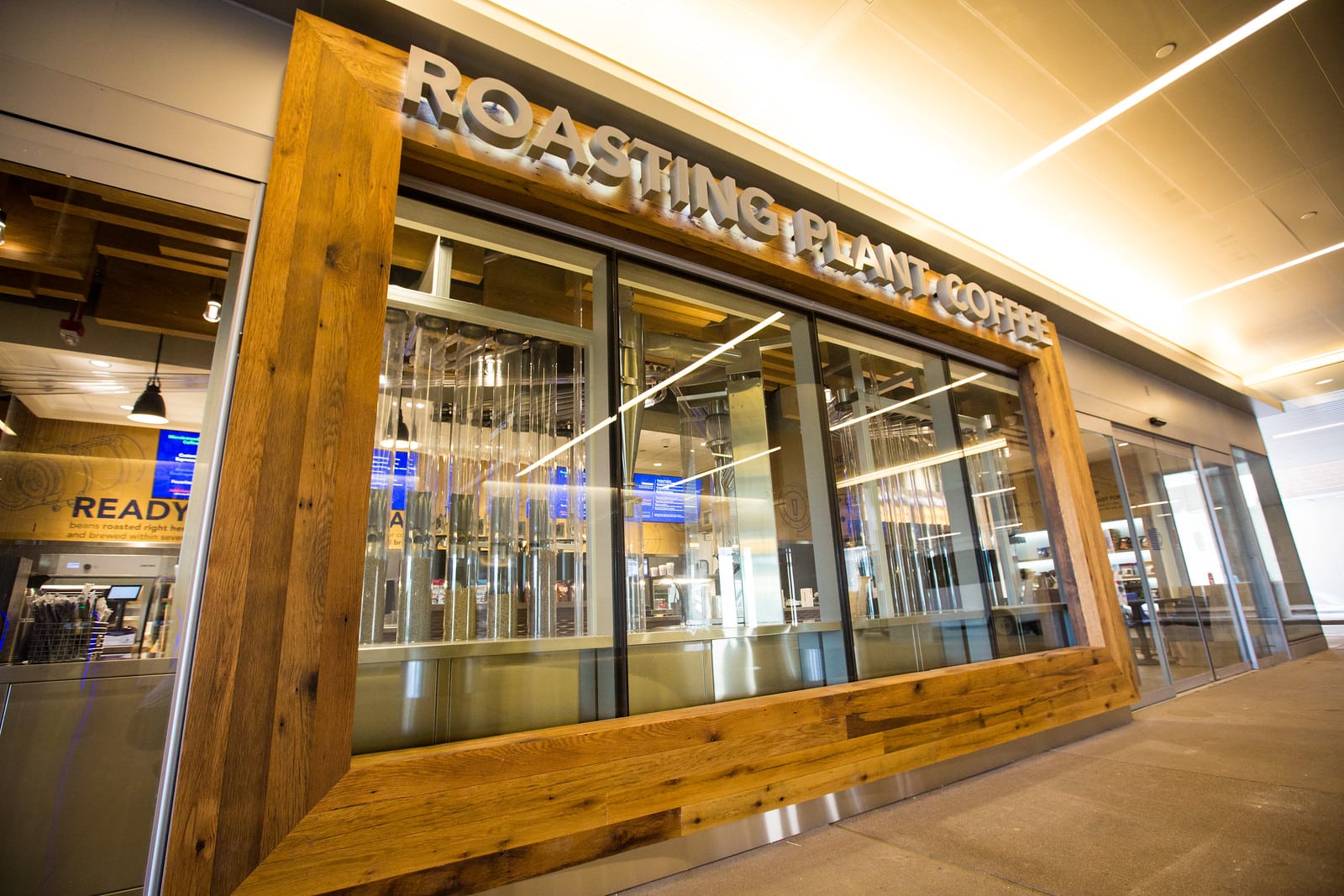
Lee Driscoll, co-CEO of Cherry Cricket’s parent company, poses for a portrait outside the restaurant on June 6. (BusinessDen file)
A three-week civil trial about alleged bid-rigging of a lucrative restaurant contract at Denver International Airport came to an abrupt end Tuesday.
Jurors were sent home five minutes after they arrived Tuesday morning while lawyers for both sides discussed and then reached a confidential settlement, bringing the case to a close.
For nearly six years before that, DIA Brewing, a company affiliated with Wynkoop Brewing and the Cherry Cricket, sued Michigan-based Midfield Concession Enterprises.
DIA Brewing accused Midfield and former Midfield executives of bribing DIA’s former chief revenue officer to rig bids and ensure that Midfield won the most lucrative concession contract in DIA history — to run two restaurants, a brewpub and a coffee shop — in 2015.
A trial to resolve the long-running case began Monday morning in Denver District Court.
Day 1 was largely taken up by a lengthy jury selection, which ended when a panel of six jurors and one alternate was chosen midafternoon. After being warned by Judge Jill Dorancy that opening statements are to be taken with a grain of salt, jurors heard the statements.
“This case is about a conspiracy,” said DIA Brewing attorney Isaac Mitrani. “In 2015, the airport gave out the largest concession contract ever. The evidence will show that a highly placed airport official, Bhavesh Patel, steered that contract to the defendants, who were his close friends, who he had worked with before, and who he became a consultant for later.”
“Is this an honest, transparent and fair bidding process? If you find that it wasn’t, then you should find in our favor,” Mitrani said. He later called the process “a hoax.”
Peter Gergely, lead attorney for the defendants, said that is a “wild, unsupported” claim.
“The plaintiff’s theory, which has no basis, is that somehow there was misconduct in this process and Bhavesh Patel, one man, pulled all the strings,” he told jurors.
“They didn’t win the bid and now they are complaining about it after the fact, saying that the process was rigged,” Gergely said of DIA Brewing. “There is zero evidence of that.”

Midfield Concession Enterprises operates The Roasting Plant, a coffee shop in the Westin Hotel at Denver International Airport. (Courtesy Denver International Airport)
Mitrani and Gergely talked up their clients’ respective bids as Mitrani tried to convince jurors that only corruption could lead to Midfield receiving the contract, and Gergely defended his client’s restaurants as the best choices for DIA and its millions of customers.
“What can be better than the Cricket?” Mitrani said of the longtime Denver burger joint.
Gergely touted Smashburger, which has two locations at DIA operated by Midfield.
“Far and away, this was the biggest brand that anybody proposed,” he said. “Founded in Denver and very successful, with locations in multiple airports across the United States.”
Lee Driscoll, co-CEO of the Cherry Cricket’s parent company and of DIA Brewing, watched those opening remarks from the courtroom gallery. When the arguments ended, he was called to the witness stand by Mitrani as the first, and ultimately the only, witness in the trial.
Driscoll testified that DIA Brewing had no advance knowledge of the so-called “four-pack” request for proposals in 2015 — it alleges Midfield did — but, upon learning about it, felt confident that Wynkoop, the oldest brewpub in Colorado, and the Cherry Cricket could win. He claimed that both brands are local destinations and also nationally known.
“Why do you say, sir, that the Cricket has a national reputation?” Mitrani asked its CEO.
“Well, it’s been covered in magazines that have a national circulation. We have people come in from all over the country saying they’ve heard of it,” Driscoll said.
That drew an objection from Gergely, who argued that magazine articles are not evidence of a national reputation. Dorancy agreed and urged Mitrani to move on with other questions.
At another point, Mitrani asked Driscoll about an earlier request for proposals at DIA, in 2011. Driscoll’s company was not the winning bidder for that contract either. Mitrani tried to highlight a contrast between fallout from that contract and the four-pack contract in 2015.
“Did you complain about it?” Mitrani asked about Driscoll’s loss in 2011, drawing a short laugh from his witness. “File a lawsuit? Blame the city or the airport at all?”
“Of course not.”
“Why not?”
“Because they beat us,” Driscoll told jurors. “That was a fair process and they beat us.”
Driscoll had been scheduled to retake the stand Tuesday morning before the trial ended.

Lee Driscoll, co-CEO of Cherry Cricket’s parent company, poses for a portrait outside the restaurant on June 6. (BusinessDen file)
A three-week civil trial about alleged bid-rigging of a lucrative restaurant contract at Denver International Airport came to an abrupt end Tuesday.
Jurors were sent home five minutes after they arrived Tuesday morning while lawyers for both sides discussed and then reached a confidential settlement, bringing the case to a close.
For nearly six years before that, DIA Brewing, a company affiliated with Wynkoop Brewing and the Cherry Cricket, sued Michigan-based Midfield Concession Enterprises.
DIA Brewing accused Midfield and former Midfield executives of bribing DIA’s former chief revenue officer to rig bids and ensure that Midfield won the most lucrative concession contract in DIA history — to run two restaurants, a brewpub and a coffee shop — in 2015.
A trial to resolve the long-running case began Monday morning in Denver District Court.
Day 1 was largely taken up by a lengthy jury selection, which ended when a panel of six jurors and one alternate was chosen midafternoon. After being warned by Judge Jill Dorancy that opening statements are to be taken with a grain of salt, jurors heard the statements.
“This case is about a conspiracy,” said DIA Brewing attorney Isaac Mitrani. “In 2015, the airport gave out the largest concession contract ever. The evidence will show that a highly placed airport official, Bhavesh Patel, steered that contract to the defendants, who were his close friends, who he had worked with before, and who he became a consultant for later.”
“Is this an honest, transparent and fair bidding process? If you find that it wasn’t, then you should find in our favor,” Mitrani said. He later called the process “a hoax.”
Peter Gergely, lead attorney for the defendants, said that is a “wild, unsupported” claim.
“The plaintiff’s theory, which has no basis, is that somehow there was misconduct in this process and Bhavesh Patel, one man, pulled all the strings,” he told jurors.
“They didn’t win the bid and now they are complaining about it after the fact, saying that the process was rigged,” Gergely said of DIA Brewing. “There is zero evidence of that.”

Midfield Concession Enterprises operates The Roasting Plant, a coffee shop in the Westin Hotel at Denver International Airport. (Courtesy Denver International Airport)
Mitrani and Gergely talked up their clients’ respective bids as Mitrani tried to convince jurors that only corruption could lead to Midfield receiving the contract, and Gergely defended his client’s restaurants as the best choices for DIA and its millions of customers.
“What can be better than the Cricket?” Mitrani said of the longtime Denver burger joint.
Gergely touted Smashburger, which has two locations at DIA operated by Midfield.
“Far and away, this was the biggest brand that anybody proposed,” he said. “Founded in Denver and very successful, with locations in multiple airports across the United States.”
Lee Driscoll, co-CEO of the Cherry Cricket’s parent company and of DIA Brewing, watched those opening remarks from the courtroom gallery. When the arguments ended, he was called to the witness stand by Mitrani as the first, and ultimately the only, witness in the trial.
Driscoll testified that DIA Brewing had no advance knowledge of the so-called “four-pack” request for proposals in 2015 — it alleges Midfield did — but, upon learning about it, felt confident that Wynkoop, the oldest brewpub in Colorado, and the Cherry Cricket could win. He claimed that both brands are local destinations and also nationally known.
“Why do you say, sir, that the Cricket has a national reputation?” Mitrani asked its CEO.
“Well, it’s been covered in magazines that have a national circulation. We have people come in from all over the country saying they’ve heard of it,” Driscoll said.
That drew an objection from Gergely, who argued that magazine articles are not evidence of a national reputation. Dorancy agreed and urged Mitrani to move on with other questions.
At another point, Mitrani asked Driscoll about an earlier request for proposals at DIA, in 2011. Driscoll’s company was not the winning bidder for that contract either. Mitrani tried to highlight a contrast between fallout from that contract and the four-pack contract in 2015.
“Did you complain about it?” Mitrani asked about Driscoll’s loss in 2011, drawing a short laugh from his witness. “File a lawsuit? Blame the city or the airport at all?”
“Of course not.”
“Why not?”
“Because they beat us,” Driscoll told jurors. “That was a fair process and they beat us.”
Driscoll had been scheduled to retake the stand Tuesday morning before the trial ended.
